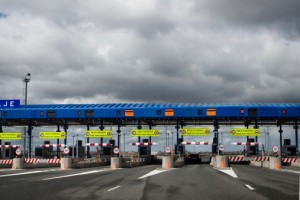Does Your Personality Drive You to Express Lanes?
 At least 12 US cities now have priced managed lanes on their highways. Also known as “express lanes” or “high-occupancy lanes,” these roadways are designed to manage traffic volume by offering priced, premium access.
At least 12 US cities now have priced managed lanes on their highways. Also known as “express lanes” or “high-occupancy lanes,” these roadways are designed to manage traffic volume by offering priced, premium access.
In some cases, drivers with multiple passengers can travel the roads for free, while single drivers pay a toll. The tolls to these roads generally vary by time of day, increasing as traffic increases (e.g. morning rush hour). Travelers often have to make spur of the moment decisions on whether to pay for a relatively free-flowing trip or a free-but-congested commute. And new research reveals that extent to which our basic personality traits drive those decisions (pun intended). For some people, the freedom to fully control their driving environment outweighs the small price of congestion-free commute.
A team of engineering and psychological researchers at Texas A&M University decided to investigate the relationship between specific personality variables and travelers’ preferences for using managed lanes. They conducted an online survey in Denver, Miami, and San Diego—three cities with managed lanes—and garnered 664 useable responses. The survey included demographic measures but was essentially designed to identify travel preferences, driving styles, carpooling preferences, and personality traits that included conscientiousness, risk tolerance, sense of personal power, and need for structure. Each participant was then asked to consider a realistic travel scenario on a major freeway in his or her home city. Travel time on the managed lanes was adjusted to always be lower than or equal to the travel time on the general purpose lanes.
The results, published earlier this year in Transportation Research Part F, show that travel-time savings, toll rate, gender, and income were the strongest predictors of managed lane use. (Women and people with higher income showed the biggest preferences for express lanes.)
But some psychological traits also influenced the usage patterns. The researchers found that only conscientiousness and a risky driving style played a significant role in the respondents’ travel preferences. Those who showed riskier driving behavior were less likely to choose carpooling—the mode that would give them the least ability to drive faster or more aggressively. Individuals who scored high on conscientiousness also resisted carpooling on the managed lanes. Meanwhile, respondents who chose the carpooling option in the driving scenario had a higher preference for carpooling, and indicated greater intentions to carpool in the future.
The findings could be highly useful to civil engineers; a better understanding of the psychological factors that play a role in driving choices could better predict the amount of usage that will occur on a managed lane.





APS regularly opens certain online articles for discussion on our website. Effective February 2021, you must be a logged-in APS member to post comments. By posting a comment, you agree to our Community Guidelines and the display of your profile information, including your name and affiliation. Any opinions, findings, conclusions, or recommendations present in article comments are those of the writers and do not necessarily reflect the views of APS or the article’s author. For more information, please see our Community Guidelines.
Please login with your APS account to comment.